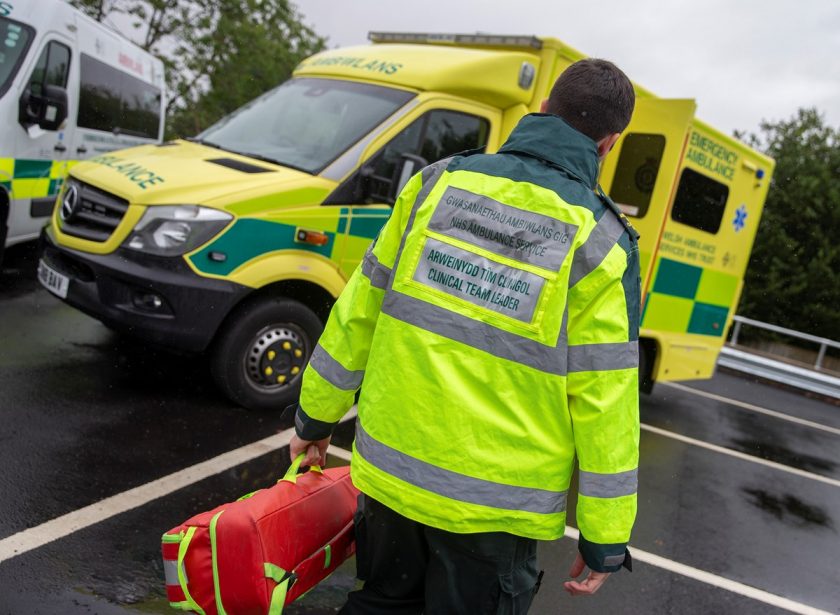Welsh Ambulance Service calls on public to take extra care this summer to “protect the service for those who need it most”

The Welsh Ambulance Service is urging the public to take extra care this summer to protect the service for those who need it most.
The easing of Covid-19 restrictions coupled with the warm weather and an influx of holidaymakers and day-trippers to Wales means the service is gearing up for a busy August.
As the school term ends and the holidays approach, the Trust is asking the public to act responsibly to prevent adding undue pressure on the service.
Director of Operations Lee Brooks said: “The ambulance service is recovering from the most challenging period in its history, and now we’re about to enter what is traditionally one of our busiest months as far as demand.
“With many people choosing to staycation this year, we’re expecting an influx of visitors to our glorious beaches and mountains, which in turn means we have a much larger population to care for.
“We have well-rehearsed plans in place to manage this additional demand, but the public has a role to play too.
“We’re asking people to take extra care over the summer to protect our ambulance service for those who need it most – you never know when that could be you or your loved one.”
Here are some tips to stay safe over summer and protect the NHS –
In the Heat
- Drink lots of water – it’s important to keep hydrated as you lose more fluid than you take in during hotter temperatures
- Keep out of the sun – it’s best to stay in the shade between 11am-3pm when the sun is at its hottest
- Wear sun cream and sunglasses – apply a sun cream of at least factor 30 that includes UVA protection and make sure your sunglasses have UV protection lenses
- Loose clothing – wear light, loose fitting cotton clothes along with a hat
- Look out for others – keep a check on those vulnerable to the effects of heat, especially the elderly, young children and babies and those who have a heart or respiratory condition such as asthma
- Never leave babies, young children or animals in a parked vehicle – temperatures can soar very quickly in a parked car, and children under two are particularly at risk of getting heatstroke or heat exhaustion
In the Water
- Don’t be tempted to take a dip in reservoirs, canals, lakes and rivers to cool down – there are hidden dangers lurking beneath the surface such as debris and underwater currents which can result in drowning
- Keep an eye out – children should always be supervised when they are in or around water and make sure they are swimming within designated areas
- Don’t be pushy – never run, push or jump on others when in a swimming pool or at the beach, and if you see someone in difficulty tell a lifeguard or call 999
- On the water – if out in a boat or canoe, always wear a lifejacket
Out and About
- Download the free what3words app on your mobile phone so 999 call handlers can find you quickly in an emergency
- Road safety – when out on a bike or scooter, always wear a helmet and beware of busy roads and cross roads safely
- Dangerous playgrounds – make sure you know where your children are going to ensure they aren’t playing in any hazardous areas such as railway tracks or abandoned buildings
- Stick together – don’t walk away and leave friends to get home on their own
- Drink alcohol sensibly – if you’re enjoying a tipple in the sunshine, be sure to know your limits and remember to drink plenty of water as the alcohol will make you even more dehydrated
At Home
- If you’re visiting Wales on holiday, make sure you know the address of your rental home, hotel, campsite or caravan park – this will be the first thing a 999 call handler will ask you
- Ensure that your house name or number is displayed clearly so our ambulances can find you in good time
- Make sure you have a well-stocked first aid kit so you’re poised to deal with any minor injuries at home – here’s what your kit should contain
- If you’re a visitor to Wales, remember to bring any prescription medicines
If you’re ill or injured and it’s not a life-threatening emergency, visit the NHS 111 Wales website, where there are 30+ symptom checkers, including for bites and stings, allergies, hay fever, sunburn and wounds.
Help and advice is also available by visiting a pharmacist or a minor injuries unit, by contacting your GP or by calling 111.
Lee added: “By taking these steps, it will help to protect our service for those who need it most and also ensure everyone has an enjoyable summer.
“If you’re visiting us from across the border, it’s also important to remember that Covid-19 restrictions are easing in Wales later than in England – for the latest position, visit the Welsh Government website.”
Spotted something? Got a story? Email: [email protected]
Latest News
